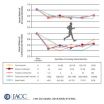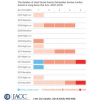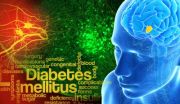(Press-News.org) Running for only a few minutes a day or at slow speeds may significantly reduce a person's risk of death from cardiovascular disease compared to someone who does not run, according to a study published today in the Journal of the American College of Cardiology.
Exercise is well-established as way to prevent heart disease and it is component of an overall healthy life, but it is unclear whether there are health benefits below the level of 75 minutes per week of vigorous-intensity activity, such as running, recommended by the U.S. government and World Health Organization.
Researchers studied 55,137 adults between the ages of 18 and 100 over a 15-year period to determine whether there is a relationship between running and longevity. Data was drawn from the Aerobics Center Longitudinal Study, where participants were asked to complete a questionnaire about their running habits. In the study period, 3,413 participants died, including 1,217 whose deaths were related to cardiovascular disease. In this population, 24 percent of the participants reported running as part of their leisure-time exercise.
Compared with non-runners, the runners had a 30 percent lower risk of death from all causes and a 45 percent lower risk of death from heart disease or stroke. Runners on average lived three years longer compared to non-runners. Also, to reduce mortality risk at a population level from a public health perspective, the authors concluded that promoting running is as important as preventing smoking, obesity or hypertension. The benefits were the same no matter how long, far, frequently or fast participants reported running. Benefits were also the same regardless of sex, age, body mass index, health conditions, smoking status or alcohol use.
The study showed that participants who ran less than 51 minutes, fewer than 6 miles, slower than 6 miles per hour, or only one to two times per week had a lower risk of dying compared to those who did not run.
DC (Duck-chul) Lee, Ph.D., lead author of the study and an assistant professor in the Iowa State University Kinesiology Department in Ames, Iowa, said they found that runners who ran less than an hour per week have the same mortality benefits compared to runners who ran more than three hours per week. Thus, it is possible that the more may not be the better in relation to running and longevity.
Researchers also looked at running behavior patterns and found that those who persistently ran over a period of six years on average had the most significant benefits, with a 29 percent lower risk of death for any reason and 50 percent lower risk of death from heart disease or stroke.
"Since time is one of the strongest barriers to participate in physical activity, the study may motivate more people to start running and continue to run as an attainable health goal for mortality benefits," Lee said. "Running may be a better exercise option than more moderate intensity exercises for healthy but sedentary people since it produces similar, if not greater, mortality benefits in five to 10 minutes compared to the 15 to 20 minutes per day of moderate intensity activity that many find too time consuming."
INFORMATION:
The American College of Cardiology is a 47,000-member medical society that is the professional home for the entire cardiovascular care team. The mission of the College is to transform cardiovascular care and to improve heart health. The ACC leads in the formation of health policy, standards and guidelines. The College operates national registries to measure and improve care, provides professional medical education, disseminates cardiovascular research and bestows credentials upon cardiovascular specialists who meet stringent qualifications. For more information, visit Cardiosource.org/ACC
Running reduces risk of death regardless of duration, speed
Running 5 minutes daily can reduce risk of cardiovascular disease-related death
2014-07-28
ELSE PRESS RELEASES FROM THIS DATE:
Endurance runners more likely to die of heat stroke than heart condition
2014-07-28
Heat stroke is 10 times more likely than cardiac events to be life-threatening for runners during endurance races in warm climates, according to a study published today in the Journal of the American College of Cardiology. The authors noted the findings may play a role in the ongoing debate over pre-participation ECG screenings for preventing sudden death in athletes by offering a new perspective on the greatest health risk for runners.
Two of the most recognized causes of sudden death during an endurance race are arrhythmic death, sudden death usually caused by undetected ...
Learning the smell of fear: Mothers teach babies their own fears via odor, research finds
2014-07-28
ANN ARBOR, Mich. — Babies can learn what to fear in the first days of life just by smelling the odor of their distressed mothers, new research suggests. And not just "natural" fears: If a mother experienced something before pregnancy that made her fear something specific, her baby will quickly learn to fear it too -- through the odor she gives off when she feels fear.
In the first direct observation of this kind of fear transmission, a team of University of Michigan Medical School and New York University studied mother rats who had learned to fear the smell of peppermint ...
New study confirms water vapor as global warming amplifier
2014-07-28
MIAMI – A new study from scientists at the University of Miami Rosenstiel School of Marine and Atmospheric Science and colleagues confirms rising levels of water vapor in the upper troposphere – a key amplifier of global warming – will intensify climate change impacts over the next decades. The new study is the first to show that increased water vapor concentrations in the atmosphere are a direct result of human activities.
"The study is the first to confirm that human activities have increased water vapor in the upper troposphere," said Brian Soden, professor of atmospheric ...
Impact of Deepwater Horizon oil spill on coral is deeper and broader than predicted
2014-07-28
A new discovery of two additional coral communities showing signs of damage from the Deepwater Horizon oil spill expands the impact footprint of the 2010 spill in the Gulf of Mexico. The discovery was made by a team led by Charles Fisher, professor of biology at Penn State University. A paper describing this work and additional impacts of human activity on corals in the Gulf of Mexico will be published during the last week of July 2014 in the online Early Edition of the journal Proceedings of the National Academy of Sciences.
"The footprint of the impact of the spill ...
The bit of your brain that signals how bad things could be
2014-07-28
An evolutionarily ancient and tiny part of the brain tracks expectations about nasty events, finds new UCL research.
The study, published in Proceedings of the National Academy of Sciences, demonstrates for the first time that the human habenula, half the size of a pea, tracks predictions about negative events, like painful electric shocks, suggesting a role in learning from bad experiences.
Brain scans from 23 healthy volunteers showed that the habenula activates in response to pictures associated with painful electric shocks, with the opposite occurring for pictures ...
Cell's recycling center implicated in division decisions
2014-07-28
Most cells do not divide unless there is enough oxygen present to support their offspring, but certain cancer cells and other cell types circumvent this rule. Researchers at The Johns Hopkins University have now identified a mechanism that overrides the cells' warning signals, enabling cancers to continue to divide even without a robust blood supply. In the process, the researchers found that lysosomes — the cell's protein "recycling centers" — help govern cell division decisions. They also uncovered new evidence that certain drugs can halt the growth of tumors that have ...
Facial features are the key to first impressions
2014-07-28
A new study by researchers in the Department of Psychology at the University of York shows that it is possible to accurately predict first impressions using measurements of physical features in everyday images of faces, such as those found on social media.
When we look at a picture of a face we rapidly form judgements about a person's character, for example whether they are friendly, trustworthy or competent. Even though it is not clear how accurate they are, these first impressions can influence our subsequent behaviour (for example, judgements of competence based on ...
Scripps Florida scientists find genetic mutations linked to salivary gland tumors
2014-07-28
JUPITER, FL - July 28, 2014 – Research conducted at the Florida campus of The Scripps Research Institute (TSRI) has discovered links between a set of genes known to promote tumor growth and mucoepidermoid carcinoma, an oral cancer that affects the salivary glands. The discovery could help physicians develop new treatments that target the cancer's underlying genetic causes.
The research, recently published online ahead of print by the Proceedings of the National Academy of Sciences, shows that a pair of proteins joined together by a genetic mutation—known as CRTC1/MAML2 ...
Glucose 'control switch' in the brain key to both types of diabetes
2014-07-28
Researchers at Yale School of Medicine have pinpointed a mechanism in part of the brain that is key to sensing glucose levels in the blood, linking it to both type 1 and type 2 diabetes. The findings are published in the July 28 issue of Proceedings of the National Academies of Sciences.
"We've discovered that the prolyl endopeptidase enzyme — located in a part of the hypothalamus known as the ventromedial nucleus — sets a series of steps in motion that control glucose levels in the blood," said lead author Sabrina Diano, professor in the Departments of Obstetrics, Gynecology ...
Physicists unlock nature of high-temperature superconductivity
2014-07-28
Physicists have identified the "quantum glue" that underlies a promising type of superconductivity -- a crucial step towards the creation of energy superhighways that conduct electricity without current loss.
The research, published online in the Proceedings of the National Academy of Sciences, is a collaboration between theoretical physicists led by Dirk Morr, professor of physics at the University of Illinois at Chicago, and experimentalists led by Seamus J.C. Davis of Cornell University and Brookhaven National Laboratory.
The earliest superconducting materials required ...
LAST 30 PRESS RELEASES:
Plastic food packaging contains harmful substances
Spring snow, sparkling in the sun, can reveal more than just good skiing conditions
Using AI to improve diagnosis of rare genetic disorders
Study unveils balance of AI and preserving humanity in health care
Capturing and visualizing the phase transition mediated thermal stress of thermal barrier coating materials via a cross-scale integrated computational approach
Study reveals emotional turmoil experienced after dog-theft is like that of a caregiver losing a child
PhRMA Foundation awards $1M for equity-focused research on digital health tools
Women with heart disease are less likely to receive life-saving drugs than men
How electric vehicle drivers can escape range anxiety
How do birds flock? Researchers do the math to reveal previously unknown aerodynamic phenomenon
Experts call for global genetic warning system to combat the next pandemic and antimicrobial resistance
Genetic variations may predispose people to Parkinson’s disease following long-term pesticide exposure, study finds
Deer are expanding north, and that’s not good for caribou
Puzzling link between depression and cardiovascular disease explained at last: they partly develop from the same gene module
Synthetic droplets cause a stir in the primordial soup
Future parents more likely to get RSV vaccine when pregnant if aware that RSV can be a serious illness in infants
Microbiota enterotoxigenic Bacteroides fragilis-secreted BFT-1 promotes breast cancer cell stemness and chemoresistance through its functional receptor NOD1
The Lundquist Institute receives $2.6 million grant from U.S. Army Medical Research Acquisition Activity to develop wearable biosensors
Understanding the cellular mechanisms of obesity-induced inflammation and metabolic dysfunction
Study highlights increased risk of second cancers among breast cancer survivors
International DNA Day launch for Hong Kong’s Moonshot for Biology
New scientific resources map food components to improve human and environmental health
Mass General Brigham research identifies pitfalls and opportunities for generative artificial intelligence in patient messaging systems
Opioids during pregnancy not linked to substantially increased risk of psychiatric disorders in children
Universities and schools urged to ban alcohol industry-backed health advice
From Uber ratings to credit scores: What’s lost in a society that counts and sorts everything?
Political ‘color’ affects pollution control spending in the US
Managing meandering waterways in a changing world
Expert sounds alarm as mosquito-borne diseases becoming a global phenomenon in a warmer more populated world
Climate change is multiplying the threat caused by antimicrobial resistance
[Press-News.org] Running reduces risk of death regardless of duration, speedRunning 5 minutes daily can reduce risk of cardiovascular disease-related death






